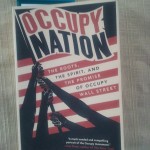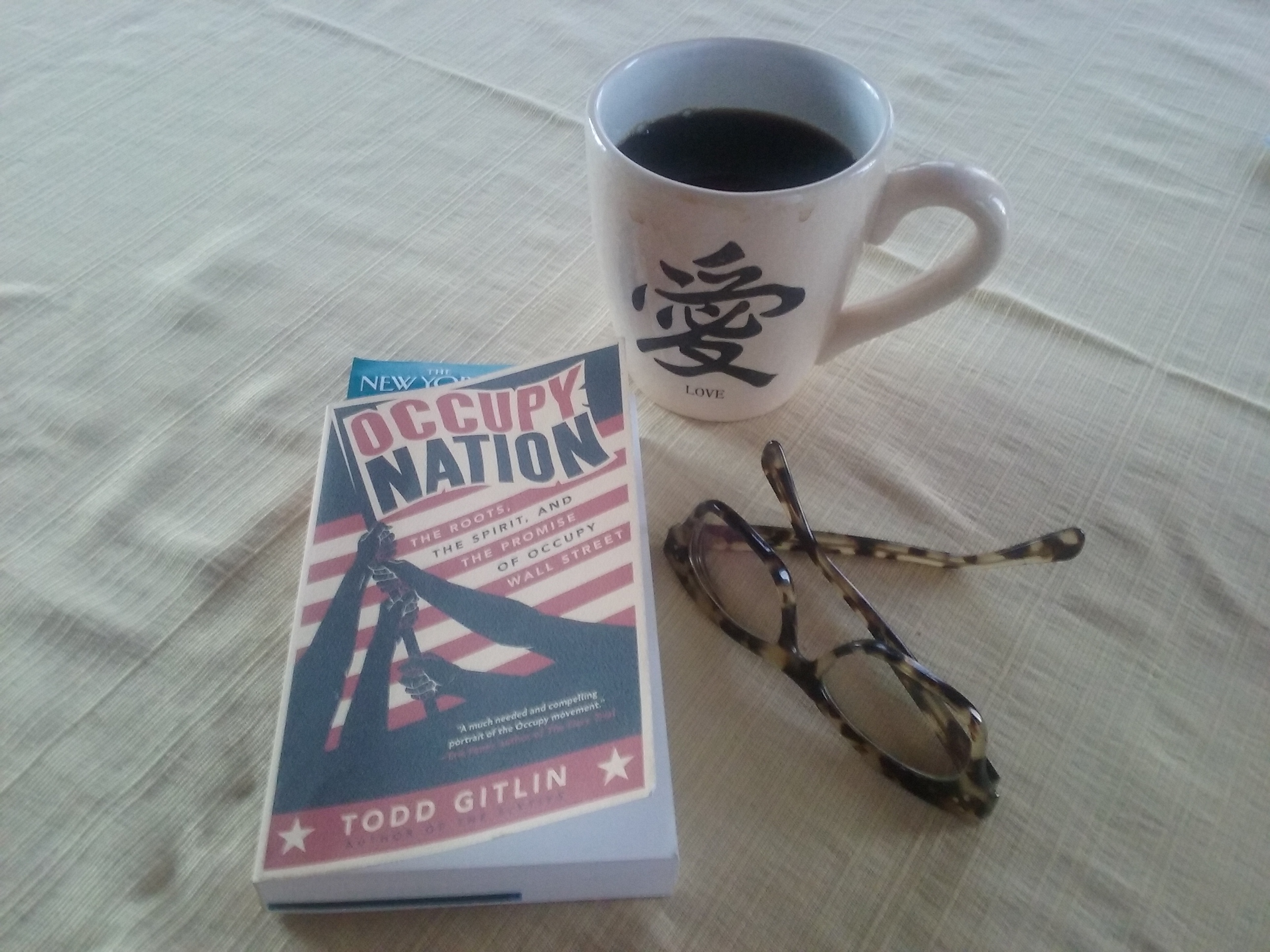I just finished reading a really interesting book Occupy Nation: The Roots, The Spirit, and the Promise of Occupy Wall Street (2012) by Todd Gitlin, who was one of the original members of Students for a Democratic Society (SDS), back in the ’60s, and is now a professor of journalism and sociology at Columbia University, an Ivy League school in New York City.
I used to teach his book The Sixties: Years of Hope, Days of Rage in my American Political Thought class (GOVT 420) at George Mason University, since my students had no idea, at all, what went on in the ’60s. SDS famously issued the “Port Huron Statement” in 1962 — a document still worth reading — that began, echoing Thomas Paine and other founders:
“We are people of this generation, bred in at least modest comfort, housed now in universities, looking uncomfortably to the world we inherit.”
 Gitlin observed Occupy Wall Street first hand, and his account is both fascinating and enlightening. The Occupy movement emerged in 2011 in the wake of the Arab Spring globally and progressive disappointment with Pres. Obama domestically.
Gitlin observed Occupy Wall Street first hand, and his account is both fascinating and enlightening. The Occupy movement emerged in 2011 in the wake of the Arab Spring globally and progressive disappointment with Pres. Obama domestically.
Gitlin views 2011 as a pivotal year, the end of an era:
“The year 2011 … saw an extraordinary discrediting of political-economic elites on both sides of the Atlantic…. The moral authority of both political and economic elites was at low ebb. So was the efficacy of state violence, as American troops left Iraq, mission unaccomplished. Both Osama bin Laden and the war on terror expired in 2011…. It is fair to see 2011 … as both politically and chronologically ‘the end of the decade that began with 9/11: from the year of the towers to the year of the squares.'”
While reports of the War on Terror’s demise are obviously premature, I believe 2011 was indeed a watershed year.
 It certainly was for me personally. I began my tenure at Mason the year the Towers fell — spent the morning of 9/11 in my Contemporary Political Ideologies class, helping my students hold it together. Since Mason has many students from military families and a very large population of Muslims, we were worried about violence on campus, but in the end we had none.
It certainly was for me personally. I began my tenure at Mason the year the Towers fell — spent the morning of 9/11 in my Contemporary Political Ideologies class, helping my students hold it together. Since Mason has many students from military families and a very large population of Muslims, we were worried about violence on campus, but in the end we had none.
2011 was my last year of teaching, and I was in a very dark place in my political thinking. I taught two senior seminars that year, and I often note that my students kept hope alive for me. During my final semester, we killed bin Laden. Many students went into DC that night to celebrate his death. Indeed, they had grown up in his shadow — having been third graders on 9/11 — so his death had an impact. The next day, we discussed whether it’s ever appropriate to celebrate the death of a human being. I was pleased that, upon reflection, they thought not.
![reactions-binladen-death4[6]](http://clairesnyderhall.com/wp-content/uploads/2016/01/reactions-binladen-death46.jpg) When Occupy mobilized in 2011, I was just beginning my five year foray into party politics. I had never been very involved in electoral politics before. When I was on the career track, I just worked all the time. Before grad school, however, I had been an activist — anti-Apartheid, anti-Contra, anti-nuke, peace activist, radical feminist.
When Occupy mobilized in 2011, I was just beginning my five year foray into party politics. I had never been very involved in electoral politics before. When I was on the career track, I just worked all the time. Before grad school, however, I had been an activist — anti-Apartheid, anti-Contra, anti-nuke, peace activist, radical feminist.
I have always conceived of my life’s work as political — doing my part to rebuild the Left — but as the Left was actually mobilizing in the US with Occupy, I took a different path and got involved with the Sussex Democratic Party.
 Five years later, in light of all I’ve learned about party politics and how things really work, I can see, more clearly than ever, how much we need a strong progressive movement in this country and globally. That is why I am so thrilled that, after a short hiatus, the Left is back on the rise with Black Lives Matter, Fight for 15, and the Sanders campaign. And regardless of who wins the election, a political revolution is rolling, and we will not be stopped!
Five years later, in light of all I’ve learned about party politics and how things really work, I can see, more clearly than ever, how much we need a strong progressive movement in this country and globally. That is why I am so thrilled that, after a short hiatus, the Left is back on the rise with Black Lives Matter, Fight for 15, and the Sanders campaign. And regardless of who wins the election, a political revolution is rolling, and we will not be stopped!
Party operatives can do what they want to stymie progressive change and shore up their own power and the power of incumbents, but we will not be stopped!
We will not be stopped until “justice rolls down like waters” in a “mighty stream”!
Some people think that voting is the answer to every problem. Voting is important, but it is not enough. Even if you have decent people to elect, which is often not the case, once they are elected, they get caught up into the continuous campaign, constantly focusing on raising money and getting reelected.
 We need visionary social movements to keep their proverbial feet to the fire! And to have an impact, you cannot allow yourself to be taken for granted. You do not endorse a candidate unless that candidate pledges to support your agenda. Elizabeth Warren understands that!
We need visionary social movements to keep their proverbial feet to the fire! And to have an impact, you cannot allow yourself to be taken for granted. You do not endorse a candidate unless that candidate pledges to support your agenda. Elizabeth Warren understands that!
In Occupy Nation, Gitlin made some interesting comments about social movements vs. parties:
“Movements are social organisms, living phenomena that breathe in and adapt to their environments, not objects frozen into their categories while taxonomists poke and prod them. They come, go, mutate, expand, contract, rest, split, stagnate, ally, cast off outworn tissue, decay, regenerate, go round in circles, are always accused of being co-opted and selling out, and are often declared dead. If they are large, they contain multitudes, and contradict themselves….
“Disputes [between social movements and parties] are intrinsic because movements and parties differ fundamentally…. Movements tend toward horizontality and parties run hierarchically. Careers and rewards in parties are drastically different from careers and rewards in movements. Movements must confront marginality but parties must confront corruption. Movements attract the unruly, parties the manipulative…. This is not necessarily because any of the protagonists are wicked. But these two very different social phenomena do tend to attract different types of individuals and then sharpen the differences between them.”
We need social movements to articulate a vision. And we need parties and politicians to transform that vision into policy. And if those two things happen, we have democratic self-government.
